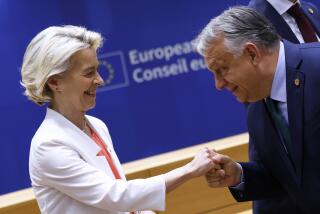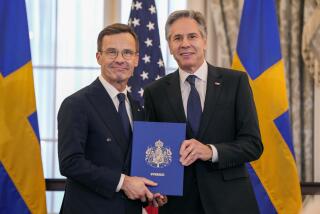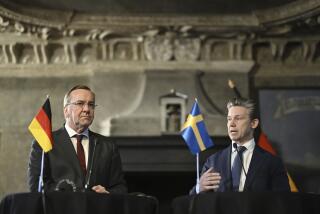With EU Role and Bush’s Visit, Sweden’s Moving Into the Fold
- Share via
STOCKHOLM — As Sweden prepares for the Jan. 1 start of its European Union presidency, officials are talking up the importance of the Three E’s--enlargement, environment and employment. But it’s really the Dubya that is drawing the most attention.
President-elect George W. Bush is expected to make the first-ever U.S. presidential visit to Sweden sometime late in this Nordic nation’s six-month stewardship of the alliance, Swedish and U.S. officials have confirmed.
“It is traditional for a new U.S. president to visit Europe on his first foreign trip,” says Inger Viklund-Persson, Foreign Ministry spokeswoman for Sweden’s EU tenure. “And as EU president, that visit would be made here, although he will be paying a call on Europe, not just Sweden.”
U.S. Embassy officials had begun laying the groundwork for the visit even before the protracted presidential election determined who would become the new American leader. A senior U.S. diplomat in Europe has since confirmed that Bush will take part in one of the EU gatherings in Sweden--most likely a summit in Goteborg in June.
Still, the Swedish hosts say they hope to accomplish much more than symbolic statesmanship while holding the EU reins.
At a news conference this week, Prime Minister Goran Persson identified negotiations on EU enlargement that will include new members from Central and Eastern Europe beginning in 2003 as the defining task for alliance leaders next year.
Some of the meetings and seminars planned across Sweden from January through June will include the 12 candidate states for the first time. Those talks also will cover concerns about environmental problems in heavily polluted Eastern Europe and the influence that millions of lower-wage workers entering the alliance labor market might have on the 15 existing EU states, many of which already suffer high jobless rates.
While Sweden and neighboring Norway have earned reputations for ably mediating crises around the world, Stockholm’s commitment to EU politics is shaky at best. Swedes voted in 1994 by the narrowest of margins to join the bloc, and their rejection of the common currency, the euro, has become more and more adamant. Sweden also is one of only four EU states that is not a member of the North Atlantic Treaty Organization.
But some Swedish officials contend that being outsiders brings fresh perspective to divisive issues within the alliance, such as the EU plan to create a 60,000-strong rapid-reaction force for peacekeeping and humanitarian missions. Washington, in particular, has voiced fears that the EU force, which is expected to be ready for deployment by 2002, will draw resources away from NATO activities and create confusion with its separate chain of command.
“We will try to find a formula that all can accept. We will work in a pragmatic way,” Swedish Defense Minister Bjorn von Sydow told a news conference last week, saying Stockholm had been asked by fellow EU states to smooth out the wrinkles in relations with NATO.
Sweden’s self-exclusion from the euro zone may prove more problematic. It is traditional for the finance minister of the country holding the rotating presidency to chair high-level gatherings to chart monetary policy, but the task for the next six months will fall to visiting colleagues from states actually using the euro.
Sweden’s ruling Social Democrats early this year pledged to hold another referendum on joining the euro zone, but no date has been set and popular support has been falling. A mid-December poll by the national statistics office, the SCB, rated support for using the common currency at 28% last month, compared with 39% a year earlier.
The governing party also faces opposition from its allies in parliament, the ex-Communist Left Party and the Greens, both staunchly against swapping the krona for the euro. Left Party leader Gudrun Schyman has vowed to use the country’s moment in the EU spotlight to cement opposition to the euro.
“The Finns showed during their presidency that it is possible to have influence without pushing your own agenda, but Swedes have a tendency to be very Swedish,” says Viklund-Persson. “This [presidency] may be a necessary lesson for a lot of people on how to be Europeans.”
Williams was recently on assignment in Sweden.
More to Read
Sign up for Essential California
The most important California stories and recommendations in your inbox every morning.
You may occasionally receive promotional content from the Los Angeles Times.














